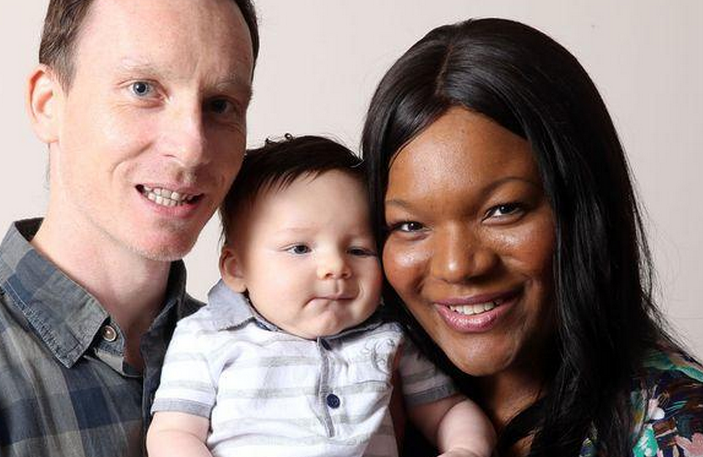White Baby Born To Black Mom Defies Million-To-One Odds: How Atavism Influences Skin Color

A Nigerian mom-to-be got an unexpected surprise in the delivery room when she gave birth to her newborn baby boy. Catherine Howarth, a UK citizen with dark skin, of Nigerian heritage, shocked midwives and doctors at Milton Keynes Hospital in England when baby Jonah came out of his mother’s womb: He was completely white. Catherine, along with her husband Richard, who is white, were equally astonished, after expecting their son to have darker skin. The odds are one in a million.
“His complexion was very pale due to the umbilical cord being wrapped around his neck when he was being delivered,” Richard told the Sunday Mirror. “After a few hours, his color came to his cheeks. Catherine and I noticed his complexion was very similar to mine and were surprised it was as light. The midwives and doctors told us he’ll most likely remain this color.”
Although some children are known to get darker after a few weeks of birth, showing the skin color they will have for life, parents and doctors can determine pigmentation by looking at the tips of their ears. However, the interracial couple could immediately tell Jonah was fully white and not albino. Doctors believe Catherine has been carrying a recessive gene, which may explain her newborn’s unlikely pigmentation.
Jonah’s skin color may be influenced by a process known as atavism. According to HowStuffworks, the unusual trait derives from a distant evolutionary ancestor that reappears in a modern-day organism, or in this case, a newborn. Catherine probably had a white ancestor in her family, which led to a recessive gene throughout generations. The gene possibly laid dormant until Richard’s and Catherine’s genes were thrown together to form Jonah’s DNA.
How a white baby can be born to a black mother - the statistics of skin colour: http://t.co/fChopcmt7U pic.twitter.com/XOKXb14HlM
- Ampp3d (@ampp3d) September 1, 2014“My parents were from Nigeria and, for as far back as anyone can remember, my family have all been black,” Catherine said. “But at some point there must have been a white gene in my family that has remained dormant for years and years — until now.” There was one in 20 alleles, or roughly a million to one chance Catherine’s recessive gene could actually impact Jonah’s skin pigmentation.
The genes that control the amount of melanin, or the pigmentation in someone’s skin usually operate under “incomplete dominance.” This means no specific trait will dominate the others as all the variant gene traits will be seen in the offspring. Children of interracial couples, like Jonah, will usually have a skin tone that reflects a mix of its parents.
Jonah’s case follows the 2010 birth of Nmachi Ihegboro, a baby born with white skin despite having two Nigerian dark skin parents. Doctors suspect Nmachi is either the result of a gene mutation unique to her, the product of long-dormant white genes, or has some kind of mutated version of albino, which would lead to her skin darkening over time. Infidelity has been ruled out as a possibility for the Nigerian couple.
Despite the initial shock of Jonah’s skin color, Catherine and Richard admit they couldn’t be happier, and adore their “beautiful, happy, and smiling son.” “The color of his skin is of no concern — Jonah being a healthy and happy baby is what matters,” Richard said.
Published by Medicaldaily.com



























